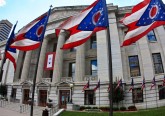Ohio Legislature asked to reconsider action
By Steve Trosley
The Catholic Telegraph
The Catholic Conference of Ohio, on behalf of the Catholic Bishops of Ohio, have written a letter including a Reflection Statement on SB 310 — Ohioʼs alternative energy portfolio standards. The reflection provides a brief overview of Catholic Churchʼs teaching regarding care for creation, our Conferenceʼs overall support for alternative energy and efficiency incentives, and recommendations regarding SB 310.
Tony Stieritz, director of the office of Catholic Social Action office shared the communication this week and said the Ohio Bishops are not advocating for specific benchmarks for alternative energy sources and incentives. However, they encouraged legislators to pursue reasonable and effective initiatives for energy efficiency and to develop alternate renewable and clean-energy resources.
The Conference letter said that through firsthand experience, “we have come to appreciate the impact the current energy portfolio standards have on improving the energy efficiency of church facilities and individual households. For example, the economic rebate incentives have allowed for affordable boiler replacement and lighting retrofit projects in many of our buildings.”
The Conference supports the proposed study of Ohioʼs portfolio standards in order to determine if adjustments should be made to mitigate environmental concerns and make increased energy efficiency more affordable for all consumers.
However, the Conference noted: “We understand there is an ongoing debate over the need to freeze current standards while a study takes place. We ask you to prayerfully consider if it would be more prudent for the sake of environmental stewardship to maintain our current policies and not freeze these standards while the study takes place.”
Ohio law requires electric distribution utilities and electric services companies to secure a portion of their electricity supplies from alternative energy resources. By the year 2025, 25 percent of the electricity sold by each utility or electric services company within Ohio must be generated from alternative energy sources. At least 12.5 percent must be generated from renewable energy resources, including wind, hydro, biomass and at least 0.5 percent solar. All companies must meet annual renewable and solar energy benchmarks that increase as a percentage of electric supply each year.
SB 310 proposes that the state freeze these benchmarks at the current 2014 levels, and establish a study committee to review the appropriateness of such mandates.
The Catholic Conference of Ohio “supports alternative energy and conservation incentives and resources. Alternative energy sources — such as wind and solar — benefit the environment, help reduce long-tem energy costs, and offer another source for helpful job creation.” While not advocating for specific benchmarks for alternative energy sources and incentives the Conference letter to the legislators encourages the General Assembly “to pursue reasonable and effective initiatives for energy efficiency and to develop alternate renewable and clean-energy resources.”
The Conference statement encourages elected officials to study the future direction of Ohioʼs portfolio standards and to determine if adjustments should be made to mitigate environmental concerns and make increased energy efficiency more affordable for all consumers. Further: “We understand there is an ongoing debate over the need to freeze current standards while a study takes place. We ask elected officials to prayerfully consider if it would be more prudent for the sake of environmental stewardship to maintain our current policies and not freeze these standards while the study takes place.”
The statement is signed by Cincinnati Archbishop Dennis M. Schnurr, Chairman of the Catholic Conference of Ohio and by the bishops and auxiliary bishops of the other dioceses of Ohio.
Stieritz said the bill is moving rapidly through the General Assembly.
Posted May 28, 2014.













